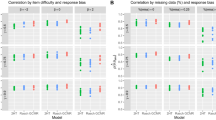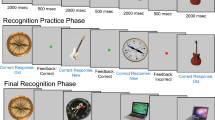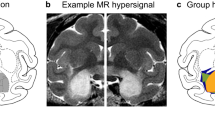Abstract
RECOGNITION is often possible where recall is not. The inference that memory is superior when tested by the former procedure has been challenged by Davis et al.1, who showed that the number of alternatives from which the items seen previously must be selected was a crucial factor governing performance. When the number in the recognition test is as great as that which could reasonably be considered in recall, recognition performance is no better than recall.
This is a preview of subscription content, access via your institution
Access options
Subscribe to this journal
Receive 51 print issues and online access
$199.00 per year
only $3.90 per issue
Buy this article
- Purchase on Springer Link
- Instant access to full article PDF
Prices may be subject to local taxes which are calculated during checkout
Similar content being viewed by others
References
Davis, R., Sutherland, N. S., and Judd, B. R., J. Exp. Psychol., 61, 422 (1961).
Judd, B. R., and Sutherland, N. S., Inform. Control, 2, 315 (1959).
Author information
Authors and Affiliations
Rights and permissions
About this article
Cite this article
DALE, H., BADDELEY, A. Alternatives in Testing Recognition Memory. Nature 196, 93–94 (1962). https://doi.org/10.1038/196093a0
Issue Date:
DOI: https://doi.org/10.1038/196093a0
Comments
By submitting a comment you agree to abide by our Terms and Community Guidelines. If you find something abusive or that does not comply with our terms or guidelines please flag it as inappropriate.



